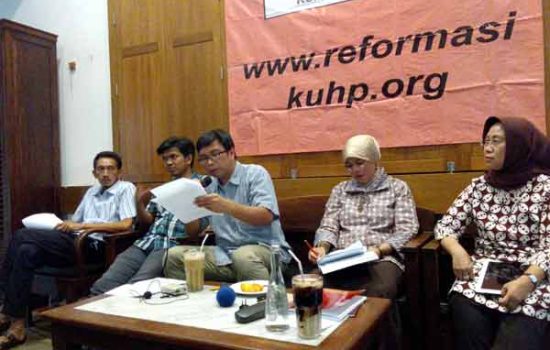The government has been aware of the negatives effects of the Caning Punishment but preferred efforts to cover this issue rather than completely abolish this type of punishment.
In 2017, ICJR noted that the practices of caning in Aceh are still relatively high and increasing since the Qanun Jinayat entry into force in 2015. According to ICJR’s 2016 Data Monitoring, from January to November, the Aceh Sharia Court has ruled 301 Jinayat cases. Furthermore, from January to December, the caning of 339 convicts have been carried out in all parts of Aceh.
Based on January to September 2017’s Monitoring result, at least 188 people were punished by caning in all 9 Aceh regions. ICJR presumes that the number will still increase. The contrasting numbers between 2016 and 2017 are due to in 2017 there are only 9 areas that can be monitored by the ICJR. In the research conducted, the Aceh Sharia Court’s Website no longer provides the Statistical Update of Qanun Jinayat case in Aceh.
With this limited research, up to September 2017, there was twenty-four punishment by caning carried out in public. Banda Aceh is the highest place with 6 caning carried out, followed by Sigli/Pidie and Jantho/Aceh Besar with 4 caning. Lhokseumawe also for the first time has carried out the caning punishment since the Qanun Jinayat came into force.
In that period, the caning of 188 convicts was carried out consistently from January to September 2017, the highest number being in July with 34 people and followed earlier in the year with 32 people. Looking at this number, at least every month there were 11 people who were punished by caning in Aceh, with the average of 21 people.
Based on the gender, deriving out of these 188 people there were 32 women and 156 men. The number of men punished by caning is relatively similar to the results of ICJR monitoring in 2016.
Arising out of the number of strokes imposed on the convicted persons, the ICJR’s record shows that there were 4945 strokes of the cane have been given throughout 2017. The number of strokes given is also quite alarming. Looking at the monthly execution, the smallest number was in January with 134 strokes. The highest number of strokes of the cane was in May with 989 strokes, March with 758 strokes, June with 720 strokes and in September with 791 strokes. On average there were 549 strokes of the cane executed each month.
Qanun Jinayat regulates some new crimes that are not regulated in the National Criminal Law, such as Khamar (alcohol-related crime), Liwath (same-sex relations) to the expansion of extramarital affair in the Khalwat. In the data found, the crime that most often appeared is Maisir (gambling) with 109 convicts, followed by Ikhtilath (intermingling of men and women in one place) with 47 convicts, Zina (extramarital relations) with 13 people and Khamar (alcohol-related crime) with 9 people. 2017 is also the year of the first time a caning punishment applied for Liwath violation (same-sex sexual relations), for this crime 2 convicts were punished by caning.
From these practices of caning punishment, there are some important outlines that ICJR concerns, namely:
Firstly, in July 2017 the Government of Aceh Province recommended an adjustment of the caning punishment. One of the reasons is related to Aceh’s economic growth which is below the national average. The adjustment is to change the procedure of the execution of the punishment so not to be done in front of the public. This is done so in order to avoid negative perceptions that affect the investment interest in Aceh. The execution of caning punishment will be held in a closed place with the presence of several witnesses. It will be done inside the correctional institutions, so it will not be recorded and dramatized.
ICJR sees that this is a wrong approach, the footing of the more important problem is the issue of human rights and not just merely a matter of lack of investment in Aceh. Additionally, ordering the caning execution to be done in private will not solve the problem in Aceh. This policy will, in fact, lead to a closed-door penalty policy and a new problem. The government seems to have realized the adverse effects of the caning punishment but prefers efforts to hinder the monitoring access in the interest of the Aceh’s investment rather than eliminating this type of punishment.
ICJR since the very beginning has strongly criticized the public caning execution and at this moment, adding to the list, ICJR also rejects the policy allowing the punishment to be done in private; this policy has the potential to result in lack of supervision and vulnerable to abuse of power. ICJR also found that some information related to the implementation of Qanun Jinayat is no longer open to the public. ICJR questions the disappeared statistic data of caning punishment for violating Qanun Jinayat in the Shariah High Court.
Second, Qanun Jinayat has a vast potential and tendency to discriminate women. In addition to the rigidly regulated rape provisions, articles that are wording Khalwat and Ikhtilath are very vague. The provisions make it easy to charge women as perpetrators. This is proved by finding that indicates that of 32 female convicts, 12 were convicted under Khalwat and extra-marital affairs, 19 convicts for violating Ikhtilath and a convict for violating Maisir or gambling.
Third, the caning punishment in Qanun Jinayat has strengthened the legitimacy of the using of corporal punishment in Indonesia. Whereas the punishment system in Indonesia strictly prohibits the use of caning. The use of caning punishment is torture, inhuman and degrading punishment. It also violates the international law on torture, and other cruel, inhuman or degrading treatment.
Based on ICJR record, there were several times when the caning execution resulted in psychic and physical injuries, in addition to cruel and inhumane and degrading treatment due to the caning punishment were done in public. An example can be seen on 2 February 2017 in Kutaraja, a convict LD (21 years old) experienced a psychic shock, so the caning must be stopped. On 27 February 2017, Z (25) received only 4 lashes due to a declining health condition. H (19) on 14 July 2017 has passed out two times during her punishment by 50 caning.
This suggests that the caning punishment that was once considered to be a social sanction to shame and presumed may have a deterrent effect, has now shifted to not only to humiliation but also to psychic and physical harm, which is clearly prohibited under Indonesian National Law and Human Rights Law.
Fourth, 2017 is the first time Qanun Jinayat used for Liwath (homosexual) violation. This caning punishment for the same-sex couples is a form of discrimination because this criminal code has caused tremendous stigma against LGBT groups and simultaneously targeting them discriminatively due to sexual orientation. In addition to being discriminatory and violating the privacy rights of citizens, this rule also provides a State legitimacy to provide severe punishment to those with different sexual orientations. This couple was given high penalties, the provision allows 100 strokes of caning for the violators. In this case, the couple was given 85 strokes.
Fifth, In 2017 a caning punishment was also imposed on non-muslim convicts. On 10 March 2017, there was an execution of 2 (two) convicts who are Buddhist. If this is left uncontrolled, this condition has the potential to put pressure on other minority religious residents in Aceh. The effect of caning punishment against certain groups of individuals has the potential to open up eigenrichting – vigilante practices.
Sixth, the ICJR affirms that the enactment of caning punishment has no positive impact at all as expected when the rule is enacted. The practice of caning punishment has failed because the number of crimes that took place remains high, especially on gambling crime, and alcohol consumption. So the caning punishment scheme actually failed to achieve its objectives and must be evaluated.
On that basis, ICJR continues to encourage the Government of Indonesia to take immediate evaluation measures to eliminate all forms of corporal punishment in its laws and regulations, in particular in the proven caning punishment which is proved to be ineffective. The caning punishment also ruins the face of Indonesia who is committed to protecting and respecting human rights.




